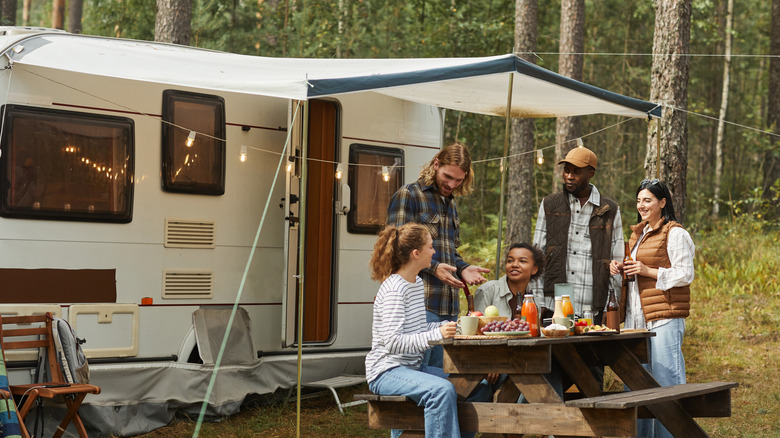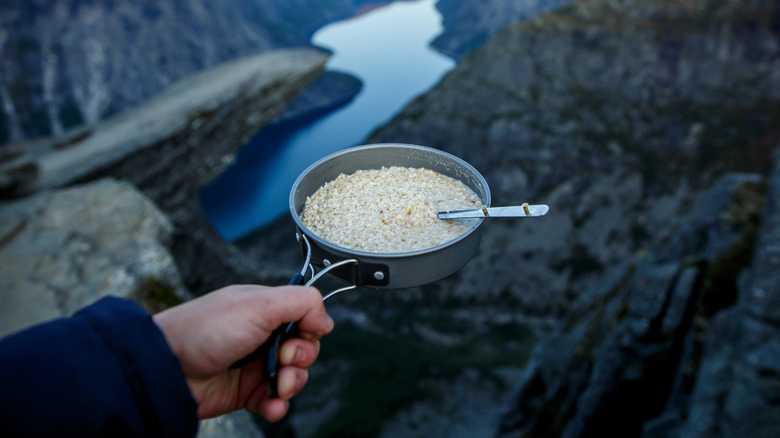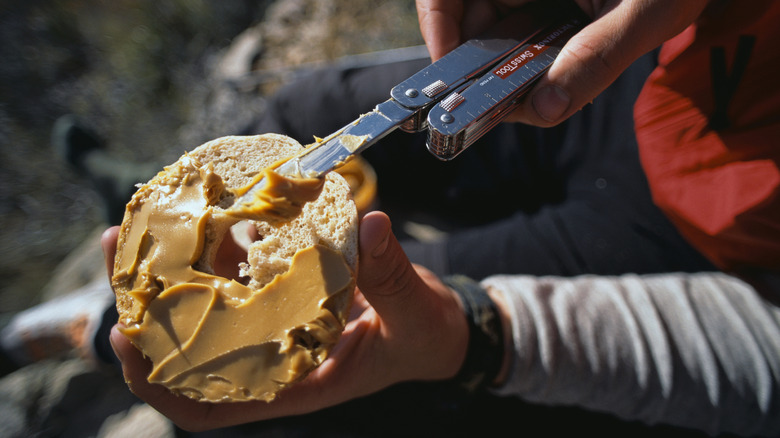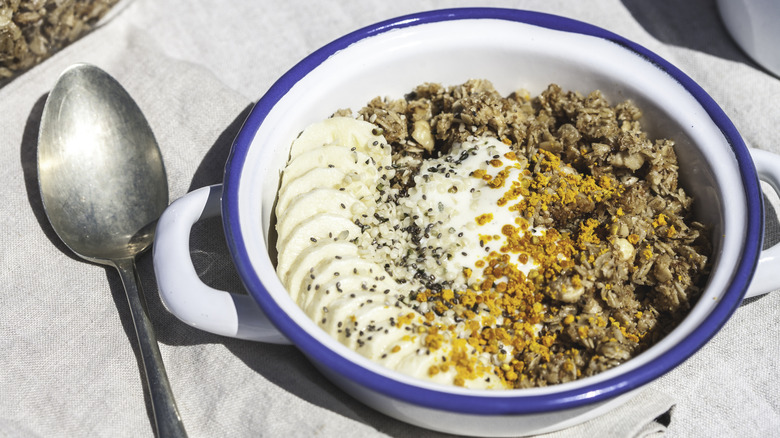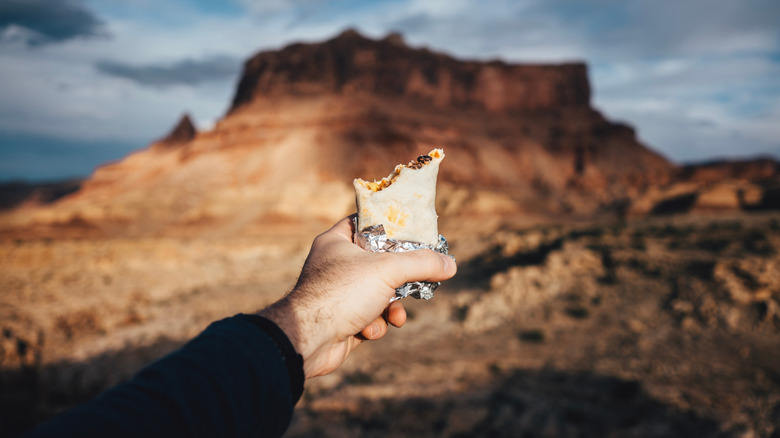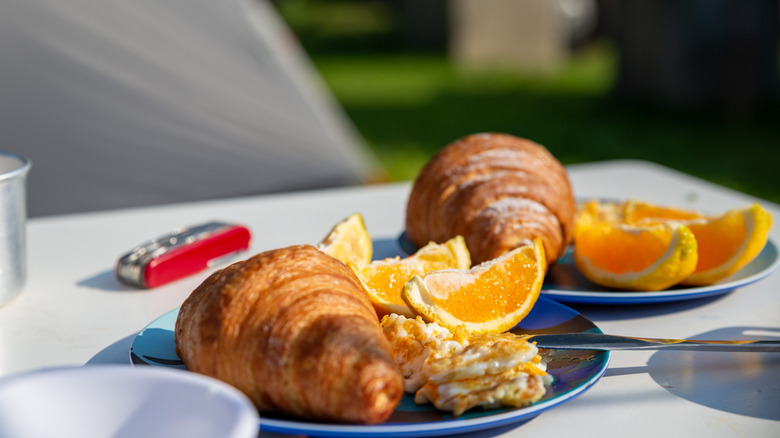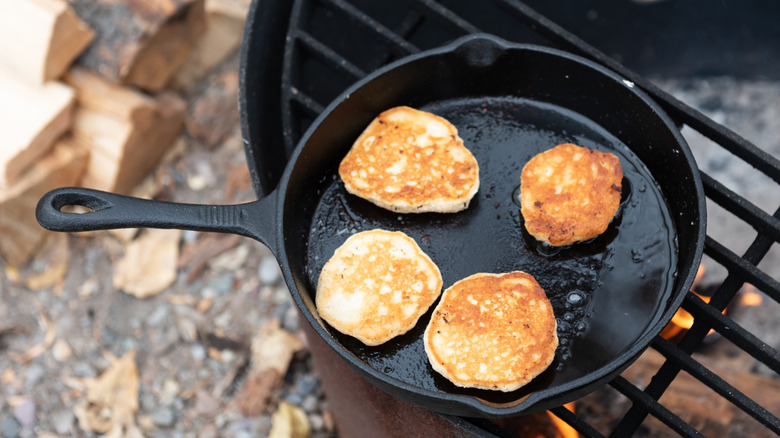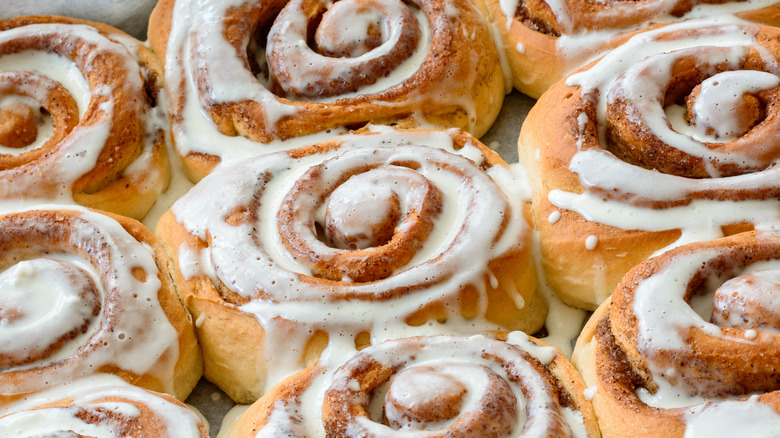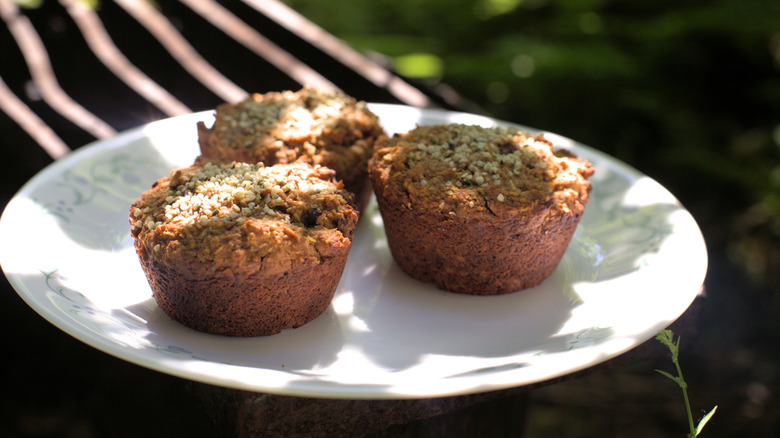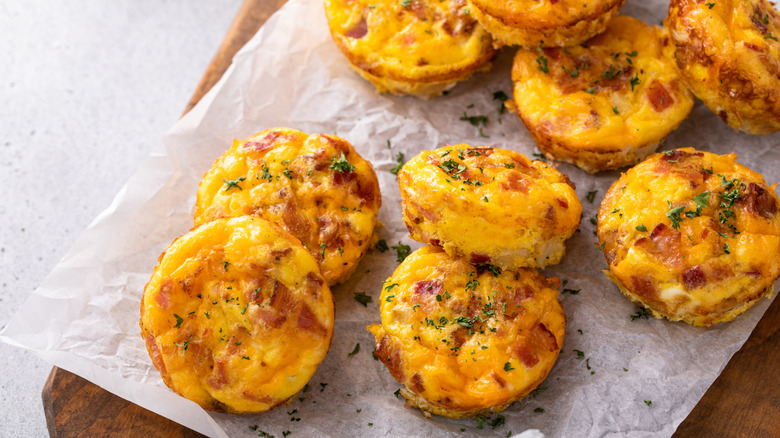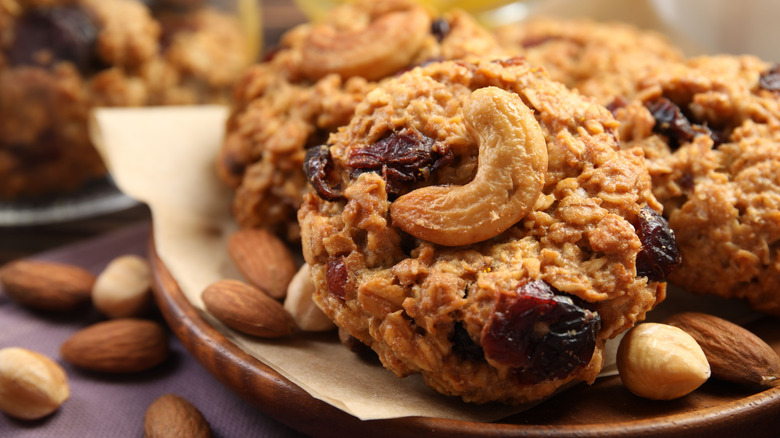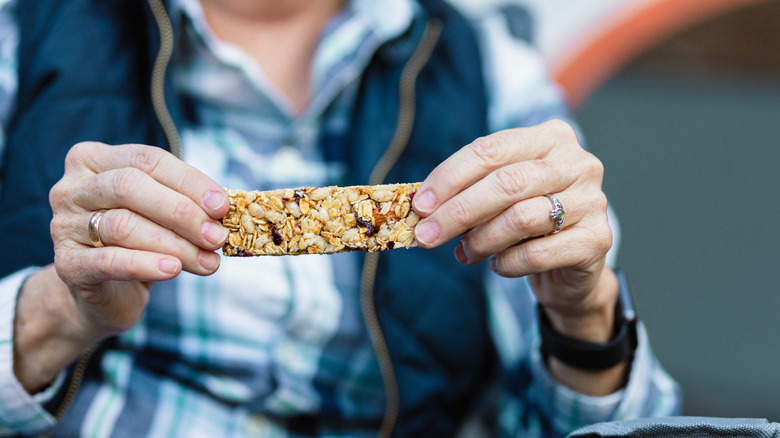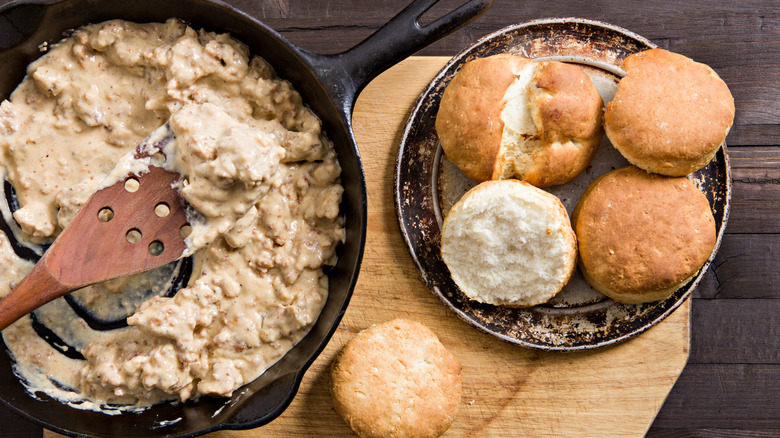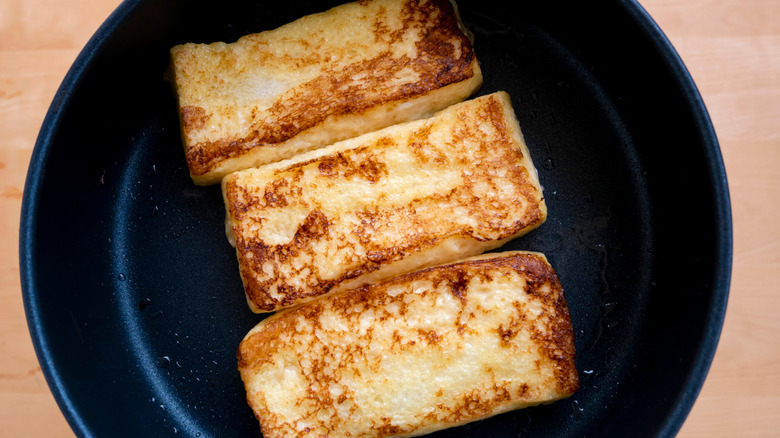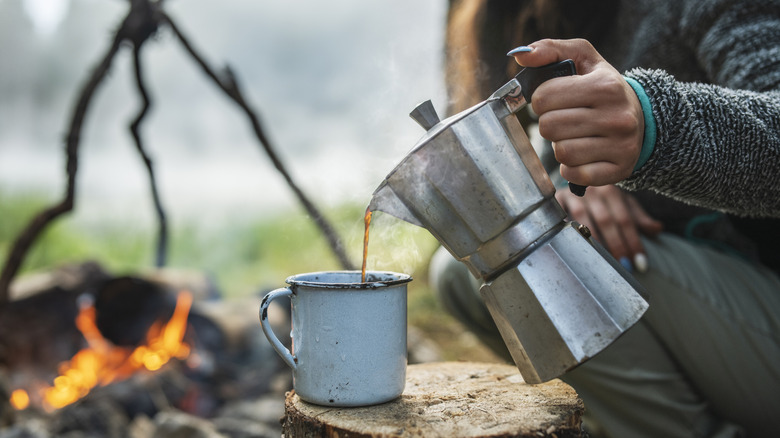The Simplest Breakfasts That Still Taste Delicious For Your Next Camping Trip
If the dawn of warmer weather has you itching to get out on the trails, you are in good company: We, too, can't wait to break out the tent and wake up to gentle sunlight and a symphony of birds each morning. As you dust off your camp stove, it's time to think about what will be on the menu this season. While dehydrated meals certainly have a time and place, don't limit yourself; cooking fresh meals in the wilderness can be a surreal, rewarding experience.
From a simple cast iron pan to a deluxe griddle, the equipment you can bring along depends on whether you are car camping or heading into the backcountry, as well as how much space and weight you can accommodate. However, you might be surprised by how much can be accomplished with a compact stove. Just make sure to familiarize yourself with TSA rules regarding camping equipment if you will be flying to your destination.
If you intend to engage in vigorous physical activity, use breakfast as an opportunity to fuel up on carbohydrates and protein. Admittedly, if you are backpacking or logging long miles for days on end, everything starts to taste good after a certain point. Then, you'll find that convenience, not taste, becomes a top priority, so plan the order of your meals accordingly. Regardless, you will find many options on this list to delight your palate and nourish you before a day of adventure.
Oatmeal
While oatmeal can seem like an obvious choice for a camping breakfast, you may be surprised by all the ingredients you can mix into your bowl of oats for a pleasing and energy-sustaining meal. Peanut butter (or powdered peanut butter if you need to save weight) will help amp up your oatmeal's protein content. Dried fruits like raisins, blueberries, and cherries can offer much-needed vitamins and minerals. If you have a sweet tooth or are staying physically active and need all the calories you can get, indulge in ingredients like M&Ms and chocolate chips. To make things simpler, stir a handful of trail mix into your oatmeal and check several boxes at once.
As for how you prepare the oatmeal, you have a few options. Making a jar of overnight oats is convenient and can be done with water or milk. Eat it cold in the morning or heat it over the stove. Otherwise, fresh, hot oatmeal can be prepared in minutes if you have the time and inclination.
Bagels
Bagels are a fantastic breakfast option for car camping when space is not an issue, but backpackers with extra room in their packs can also consider squishing in a bag of this delightful bread roll before leaving town. Opt for bagels without messy flavorings; in other words, go for the blueberry bagels instead of the cinnamon crunch. Pack bagels separately from toppings, especially if your condiments of choice are moist or messy.
Car campers have more flexibility with toppings, especially if a cooler has been packed in the trunk. The sky is the limit; you could top your bagels with scrambled eggs or raise the bar with cream cheese, capers, cucumbers, and lox. But if you are looking for something shelf-stable, opt for nut butter and sealed jelly packets. Hard cheeses like aged cheddar and pecorino can also last outside the refrigerator for quite a while. Whether you use messy ingredients, like avocados and tomatoes, is up to your discretion.
Granola
There's a reason why outdoorsy folks are often described as following a granola lifestyle. Adventurers like us can easily go through a whole bag in one sitting. Whether you toss a batch at home or pick up your favorite brand at the grocery store, granola is a wonderful, shelf-stable item to carry along for breakfast. It is packed with oats, dried fruits, and nuts. Granola also offers large amounts of protein and carbohydrates and is relatively lightweight.
You can eat granola dry and by the handful, but if you are in the mood for a more well-rounded breakfast, add it to a bowl alongside milk (or your preferred plant-based alternative). Granola also goes well with yogurt and even applesauce. If you are car camping, pack fruits like bananas and blueberries that can easily be mixed into your bowl. One of the best food hacks for hikers is to store items like granola in reusable silicone bags. This will help save space and weight since you will only pack as much as you need for the trip.
Burritos and tacos
The entire campground will be jealous of your breakfast when they smell the telltale aromas of bacon, scrambled eggs, and cheese emanating from your grill or campfire. It's pretty easy to throw together a few breakfast burritos or tacos, especially when you consider that some of the ingredients, like roasted potatoes and quinoa, can be prepared in advance. However, if you have a knife and cutting board, as well as a campfire pan or grill, you can make everything fresh, too. Be mindful of ingredients that tend to be messy, like salsa, canned beans, and avocados.
A pack of tortillas doesn't take up much space, so this breakfast is feasible for backpackers. To make it more suitable for an overnight expedition away from refrigeration, you can prepare and dehydrate the filling ahead of time. Shelf-stable ingredients like sun-dried tomatoes add a nice touch, as do spices like ground cumin and ground coriander. In fact, you can store your spices in straws to revolutionize campsite cooking if you want to pack efficiently.
Croissants
Channel your inner European and indulge in a fancy breakfast. The only difference here is that instead of being at a café, you will sit on a log surrounded by nature. How fancy you get is up to you. Croissants are available at many grocery stores and wholesale markets like Costco. However, plenty of bakeries sell them at a much higher quality (and, it should be noted, at an increased price point to match).
A plain or butter croissant can be stuffed with savory or sweet ingredients. Consider transforming your croissant into a breakfast sandwich with a simple combination of cheese and scrambled eggs. Or you could smear it with Nutella and add sliced bananas. Meanwhile, chocolate croissants lend themselves well to strawberry jam. Or, forgo the toppings altogether: Any croissant can be dipped in your morning cup of tea or coffee.
Pancakes
Who's not a fan of this quintessentially American breakfast? You can easily whip up a stack of campground pancakes if you have a pan or griddle. Just pack a bag of pancake mix — homemade or store-bought — and other necessary ingredients like eggs and milk. You can even adapt your favorite recipes to include powdered eggs and milk or choose a packaged mix that only requires the addition of water.
If the weather is cool enough, you can make pancake batter at home and store it in an old ketchup bottle for easy pouring the next morning. This will also reduce the messiness factor that goes into cooking pancakes. Similarly, cold weather might also allow you to cook the pancakes at home and store them in your bag until breakfast time rolls around.
Maple syrup tariffs got you worried? Luckily, all kinds of ingredients can be added to pancakes to help ensure that your breakfast is nutritionally well-rounded. Try topping your pancakes with fresh fruit, chopped nuts, peanut butter, and/or applesauce. Alternatively, you might want to stir blueberries or chocolate chips into the batter for a special treat.
Cinnamon rolls
A truly iconic pastry, cinnamon rolls might be the only thing that lures you out of your cozy sleeping bag in the morning. You won't regret packing a few of these sweet treats — as long as you make sure they are stashed safely in a place where they won't get squished. Packing your rolls in an aluminum pan covered with foil allows you to heat them over the firepit.
You might also consider storing the icing in a separate container to limit messiness. To continue with the mess-free trend, bring a fork and knife to eat your pastries instead of relying on your hands. Or, you could just eat it with your non-dominant hand, like most of us do! Buying or making your cinnamon rolls ahead of time will ensure a stress-free breakfast, but there are recipes for backcountry cinnamon rolls. That said, they might not turn out exactly how you'd like because a camp stove conducts heat differently than an oven.
Muffins
Muffins are best prepared in advance, but the time investment you make will be rewarded with a quick, convenient, and mess-free breakfast. Ideal for car camping (or keeping at the top of your pack for a short backcountry excursion), these breakfast treats can double as snacks for later in the day. You can buy them from the store or a bakery or bake your own. Depending on the recipe, they can be a top-notch source of protein, fiber, vitamins, and minerals.
When it comes to flavors, muffins are a pick-your-own adventure. For example, banana muffins capitalize on the natural sweetness of fruit, while mocha muffins can give backpackers the energy boost they need to start a long day of trekking. Muffins can even help you sneak in a few vegetables, which aren't particularly abundant in most campground meals. Morning Glory muffins, for instance, are packed with shredded carrots, apples, dried fruits, and coconut. It's also rather straightforward to blend spinach into any muffin batter before popping a tray into the oven.
Egg muffins
If you are going car camping and bringing along a cooler, consider preparing a tray of egg muffins for breakfast. Think of egg muffins as handheld frittatas. You can fill them with a variety of vegetables, including bell peppers, onions, tomatoes, and spinach. Cheeses like feta and cheddar and meats like ham, salmon, and bacon can lend a little more protein to each muffin. If you are vegan or avoid eggs, swap them for tofu and nutritional yeast. Finally, a sprinkling of basil can go a long way in adding fresh flavor.
Egg muffins wrapped in foil can be reheated over the campfire, but you can also bake them fresh over hot coals as long as you remember to pack a muffin tin and foil to cover everything. Once cooked, gobble your muffins plain or smash one into a sandwich. Condiments like ketchup and hot sauce are not a bad idea, either.
Breakfast cookies
Cookies for breakfast? It turns out you can have them even when it's not Christmas or your birthday, especially when they are packed with nourishing ingredients like oats, whole wheat flour, dried fruits, and nuts. So-called breakfast cookies are typically lower in sugar than, say, snickerdoodles or macarons. They also tend to swap out refined sugar for natural alternatives like maple syrup, agave syrup, and honey. High in protein, they will keep you full for longer. They also have a high fiber content and will support your digestion.
You definitely want to bake a batch of breakfast cookies at home before loading up the car; it is not worth the hassle of attempting to make them fresh over a fire or grill when they are intended to be baked in an oven. Besides, breakfast cookies are designed to be eaten cold and on the go. One or two will usually fill you up.
Bars
If you usually nibble on a light breakfast, are looking for something to eat on the go, or want to supplement your meal with extra macronutrients, stock up on a few bars. If you'd like, you can make your own at home with a baking pan or granola bar mold. Recipes commonly call for puffed rice, oats, and a sticky ingredient like honey or brown rice syrup. You can make a batch of granola bars in just fifteen minutes, especially if you are following a no-bake recipe. Wrap your bars individually in foil or wax paper for transportation.
Otherwise, there are about a million (give or take) bars on the market right now. What's incredible, though, is that despite so many of them, each brand is unique. Some bars include pea protein; others use whey. Some bars are fully encased in chocolate; others feature cacao nibs. Some are similar to traditional granola bars, while others are more like candy bars. Store-bought bars run the added benefit of being mess-free (unless it's hot and your bar includes chocolate). Just don't be a litterbug; dispose of your wrappers responsibly.
Biscuits
You can stuff just about anything into a biscuit. Simple toppings like butter and jelly are lightweight and straightforward, especially if you have snagged a few single-serving packets from fast food chains or hotel breakfast bars. If you have the bandwidth, consider cooking fresh eggs and pair them with a few slices of hard cheese and perhaps some bacon or tofu. Or, go the traditional route and pack the ingredients to make a piping hot gravy. Such a gravy can be meat-based and include sausage or vegetarian, comprising ingredients like mushrooms and tahini.
It is possible to prepare biscuits over the campfire, especially if you have a Dutch oven. You can even twist canned biscuit dough around a stick and roast it on the flames. But if you aren't up for a bit of a learning process, just make a batch of biscuits at home. They will last a few days without refrigeration as long as you aren't camping in sweltering weather.
French toast
You can make a decadent French toast breakfast over the campfire, and you don't even need a pan. Perhaps the easiest method is to prepare the breakfast as a casserole: Chop or tear your bread into small chunks, then mix it with eggs, milk, and cinnamon before wrapping everything in foil and letting it cook over hot coals. Indeed, aluminum foil conducts heat spectacularly and can cook all kinds of meals by the campfire. Of course, you can also make traditional French toast in a pan or griddle. For the best results, use thickly sliced bread, like brioche, that is slightly stale.
Due to the nature of French toast's ingredients (squishable bread, breakable eggs, and milk that should be kept cold), backpackers won't be able to indulge in "the real deal." Nevertheless, it is possible to make French toast with powdered eggs or make a vegan version using a can of coconut milk. No matter what you choose, remember that anything will taste delicious if you smother it in enough jelly or maple syrup!
Coffee
It is not always true that camping coffee tastes like pond water. Your morning cup of Joe can turn out just fine, assuming you have access to properly filtered H2O. For starters, powdered and instant coffees have come a long way over the years, and some brands, like Pilon and Café Bustelo, now yield perfectly serviceable results. If you are car camping and can bring extra equipment, your coffee will turn out even better since you won't lose the aromatics. We suggest starting with a French press to make your camping experience more luxurious.
Regardless, you might want to play around with stirring extra ingredients into your mug, whether for improved flavor or a nutritional boost. For instance, add spices like ginger and cinnamon or powdered coconut milk. You can even transform your coffee into a meal by adding it to a protein shake. If you are savoring coffee as a hot beverage, we recommend bringing along biscotti. Backpackers will find that these cookies can usually withstand a bit of rough handling without crumbling into pieces.
